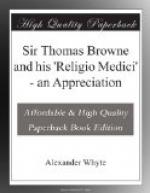* * * * *
The Letter to a Friend is an account of the swift and inevitable deathbed of one of Sir Thomas’s patients: a young man who died of a deceitful but a galloping consumption. There is enough of old medical observation and opening science in the Letter, as well as of sweet old literature, and still sweeter old religion, to make it a classic to every well-read doctor in the language. ’To be dissolved and to be with Christ was his dying ditty. He esteemed it enough to approach the years of his Saviour, who so ordered His own human state, as not to be old upon earth. He that early arriveth into the parts and prudence of age is happily old without the uncomfortable attendants of it. And ’tis superfluous to live unto grey hairs, when in a precocious temper we anticipate the virtues of them. In brief, he cannot be accounted young who outliveth the old man.’ Let all young medical students have by heart Sir Thomas Browne’s incomparable English, and wisdom, and piety in his Letter to a Friend upon the occasion of the death of his intimate Friend. ’This unique morsel of literature’ as Walter Pater calls it.
The Vulgar Errors, it must be confessed, is neither very inviting, nor very rewarding to ordinary readers nowadays. And that big book will only be persevered in to the end by those readers to whom everything that Sir Thomas Browne has written is of a rare interest and profit. The full title of this now completely antiquated and wholly forgotten treatise is this, ’Pseudodoxia Epidemica, or Enquiries into very many received Tenets and commonly presumed Truths, which examined prove but Vulgar and Common Errors.’ The First Book of the Pseudodoxia is general and philosophical; the Second Book treats of popular and received tenets concerning mineral and vegetable bodies; the Third, of popular and received tenets concerning animals; the Fourth, of man; the Fifth, of many things questionable as they are commonly described in pictures, etc.; and the Sixth, of popular and received tenets, cosmo-graphical, geographical, and historical; and the Seventh, of popular and received truth, some historical, and some deduced from Holy Scripture. The Introductory Book contains the best analysis and exposition of the famous Baconian Idols that has ever been written. That Book of




